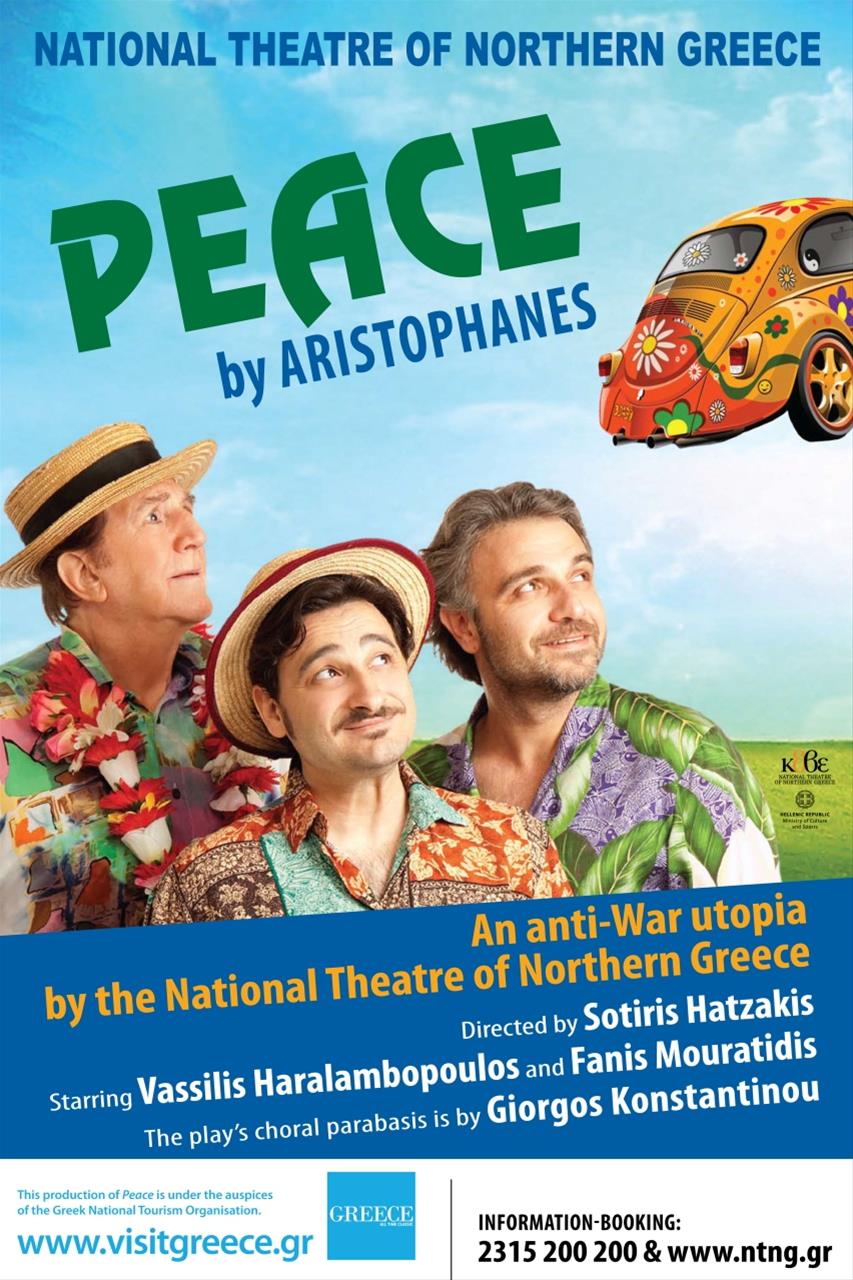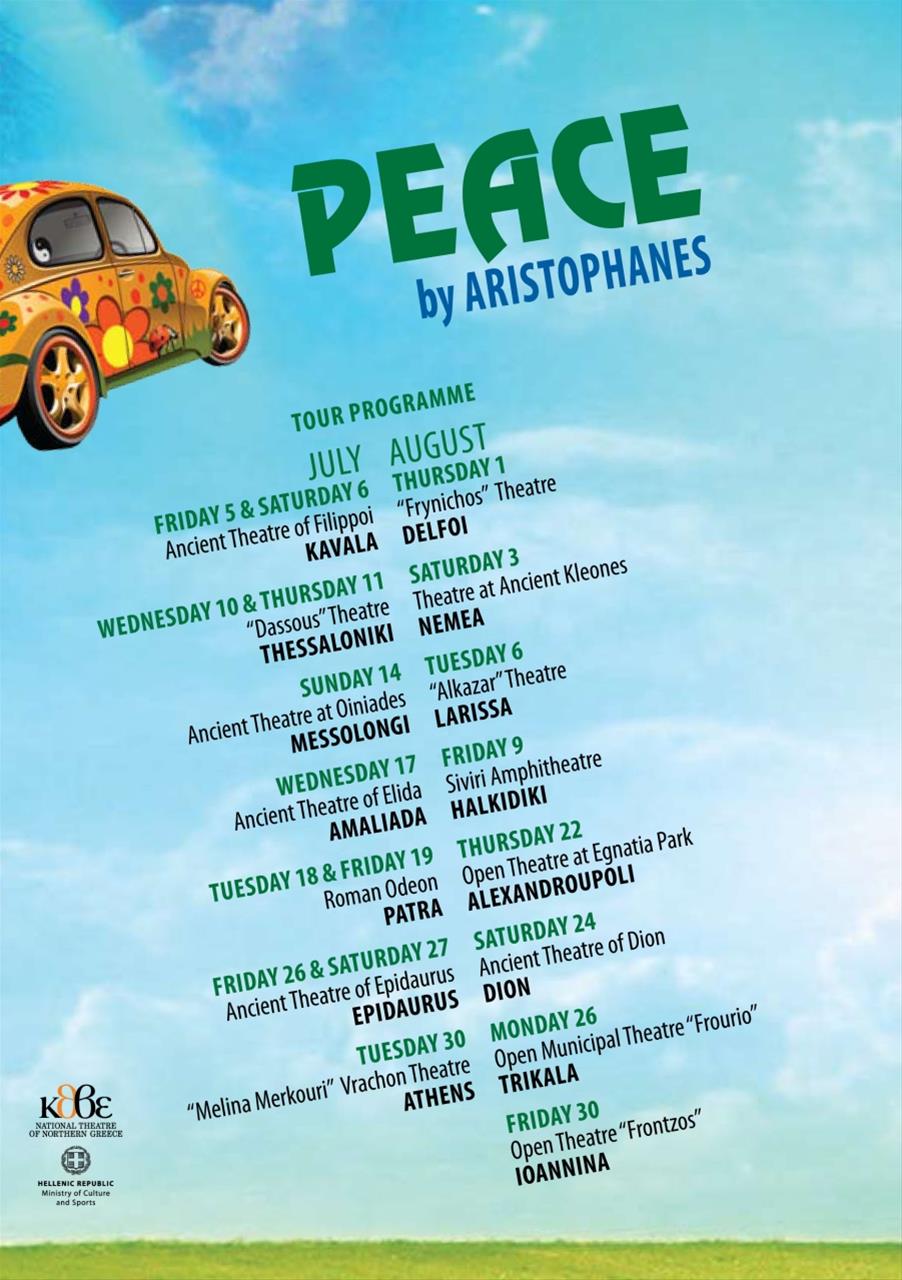Aristophanes’ anti-war utopian comedy
“Peace” will be this summer’s offering from the
National Theatre of Northern Greece. The play will be presented in the translation of
Κ.H. Myris and is directed by
Sotiris Hatzakis.
This is an extremely timely work, starring
Vassilis Haralambopoulos (Trygaeus) and
Fanis Mouratidis (Hermes) along with a large troupe of actors and dancers. The play’s choral parabasis is by
Giorgos Konstantinos.
Summary of the play
War has imprisoned the goddess Peace in a cave and is preparing to throw the Greek cities into a huge pestle and give them a terrible pounding. At that moment, Trygaeus, a vine-keeper, ascends to heaven with the god Hermes and calls upon the Greeks to set Peace free. The liberation of the goddess Peace, along with Opora, the goddess of fruitfulness, and Theoria, the goddess of festivals, comprises the heart of the play. The comedy ends with the return to earth of the triumphant Trygaeus, who brings the goddess Peace back to men.
 Director’s Note
Director’s Note
In my dream I was in Crete, and being reborn. The village was lushly green and the days fragrant with blossom. Evil had not worked its rifts. Father, mother, grandparents, all the kith and kin were there. Young forever. My father was not forced to flee, and so we never came to Athens, he never opened a tailor’s shop in Patissia, and my mother never had to labour over the stove press. Not did her husband, lacking the passport of a “social convictions certificate”, ever find a way into a job at Columbia, in Rizoupoli. They remained in Crete, in the village of Mocho in the lowlands behind Heraklion. There we were taught by the earth, my brother and I, the secret speech of rock, fire, wind and water. We learned the language of the animals; we flew with them in the paintings of Theophilus, Rousseau and Chagall. We fell in love with the cherry trees and crowned our dreams with lemon blossom. The Great Ram taught us about chasing girls and the moon sang to us of the secrets of the womb. Like young trees we grew, urgent saplings growing strong and sturdy, sighing and swaying in the moonlight. Our children were born among the grapevines, and the “grey-leaved olive that nourishes our boys” fed the blood in their veins. September, January and July taught us the dances of the seasons. The more the suffering the greater the merrymaking, my father would murmur as the dancers overcame death with a pentozali. During one such dance a girl from the village, the smallest and most defenceless, edged away, slipped out of the circle and disappeared into the hot countryside. We searched for her everywhere. Now in the heavens, with our flights of fancy, now on earth, in the dark shadows of the mind and soul. The elder folk said that the rock had opened and drawn her into a hidden cave. One of them, a man whom everyone called Aristophanes, bent down and whispered her name into my ear – Rinio, Erinaki, Irene. Eirene, he said, and I awoke to lifeless colours and a world where animals do not talk and where Old Man Pine is no longer the same person as my grandfather.
I got up then, and began ringing people up. I called Ersi and Giorgos, Vassilis, Fanis and Minos, Kiki and Antonis. And later I called Kostas, Foteini, Stella, Marina, Eleni. Come, I told them. We have to do this production now, because the dream is fading, blurring, vanishing like the frescoes beneath Rome. And when it has gone entirely we will be left with nothing but the words. Which, if they are to stand up and speak, require blood, sweat, tears, toil, and dances.
So let’s get going: Aristophanes’ Eirini (Peace).
National Theatre of Northern Greece.
July 2013… God willing!…
Translation: Κ.H. Myris
Direction: Sotiris Hatzakis
Music: Minos Matsas
Sets & Costumes Design: Ersi Drini
Choreography: Kiki Baka
Lighting Design: Antonis Panagiotopoulos
Musical instruction: Nikos Voudouris
Choral lyrics: Eleni Fotaki
Assistants Director: Foteini Baxevani, Marina Hatziioannou
Assistant Set Designer: Stella Rotsiou
Assistant Choreographer: Betty Dramissioti
Production Co-ordinator: Stella Rotsiou
Painting of set: Paris Koutsikos
Special props: Peny Dani
Vassilis Haralambopoulos as Trygaeus
Fanis Mouratidis as Hermes
Poet in the Parabasis: Giorgos Konstantinou
Cast in order of appearance:
Dimitris Morfakidis (First Servant), Nikos Magdalinos (Second Servant), Vangelis Hatzinikolaou (Trygaeus’ Daughter/ First Child), Dimitris Diakosavvas (Trygaeus’ Daughter / First Acolyte), Stelios Trakas (Trygaeus’ Daughter / Sickle-maker), Evangelos Halkiadakis (Trygaeus’ Daughter / Tamult / Crest-seller), Giorgos Kolovos (Trygaeus’ Daughter), Haris Pechlivanidis (Trygaeus’ Daughter), Vassilis Seimenis (War / Parabasis’ Leader / Roaster), Eirini Kazakou (Courtesan), Stavroula Arambatzoglou (Courtesan), Anneta Kortsaridou (Cleaning woman), Christos Ninis (First Actor / Hierokles / Parabasis’ Leader), Michalis Gounaris (Second Actor / Second Gun dealer), Katerina Giamali (Parabasis’ Leader), Nikos Kapelios (Second Acolyte), Giannis Harissis (First Gun dealer), Marina Myrtali (Second Child).
Dancers:
Elsa Siskou (Peace), Betty Dramissioti (Opora, Courtesan, Gun dealer’s attendant), Panagiota Alexiou (Theoria, Courtesan, Gun dealer ’s attendant).
Chorus of Farmers in alphabetical order:
Panagiota Alexiou, Stavroula Arambatzoglou, Katerina Giamali, Michalis Gounaris, Dimitris Diakosavvas, Betty Dramissioti, Eirini Kazakou, Nikos Kapelios, Giorgos Kolovos, Anneta Kortsaridou, Efi Lialiou, Nikos Magdalinos, Dimitris Morfakidis, Marina Myrtali, Christos Ninis, Haris Pechlivanidis, Vassilis Seimenis, Michalis Syriopoulos, Stelios Trakas, Evangelos Halkiadakis, Giannis Harissis, Vangelis Hatzinikolaou.
The production, which will be presented by the N.T.N.G. during the summer of 2013, will begin its grand tour of Greece at the Ancient Theatre of Philippi (July 5-6) to open the Festival of Philippi-Thasos and will also play at the Ancient Theatre of Epidaurus on July 26-27 and at Odeon of Herodes Atticus on September 11.
Ticket Prices
€15, 12 € (Students)
Booking: www.viva.gr T: 11876 | Papasotiriou stores | Seven Spots stores |Public stores
Ancient Theatre at Epidaurus Ticket Prices
€45 (VIP), €40 (Zone A), €25 (Zone B) , €13 (Students, Upper tier, People with movement difficulties)
Booking: Greek Festival, 39 Panepistimiou str., Τ: 210 3272000 & www.greekfestival.gr |
Papasotiriou stores | Public stores
Information: 2315 200 200 &
www.ntng.gr
 Tour Programme
JULY
Tour Programme
JULY
Friday 5 & Saturday 6
Ancient Theatre of Filippoi - Kavala
Wednesday 10 & Thursday 11
“Dassous” Theatre - Thessaloniki
Sunday 14
Ancient Theatre at Oiniades - Messolongi
Wednesday 17
Ancient Theatre of Elida - Amaliada
Tuesday 18 & Friday 19
Roman Oden - Patra
Friday 26 & Saturday 27
Ancient Theatre of Epidaurus - Epidaurus
Tuesday 30
“Melina Merkouri” Vrahon Theatre - Athens
AUGUST
Thursday 1
“Frynichos” Theatre - Delfoi
Saturday 3
Theatre at Ancient Kleones - Nemea
Tuesday 6
“Alkazar” Theatre - Larissa
Friday 9
Siviri Amphitheatre - Halkidiki
Thursday 22
Open Theatre at Egnatia Park - Alexandroupoli
Saturday 24
Ancient Theatre of Dion - Dion
Monday 26
“Frourio” Open Municipal Theatre - Trikala
Friday 30
Open Theatre “Frontzos” - Ioannina